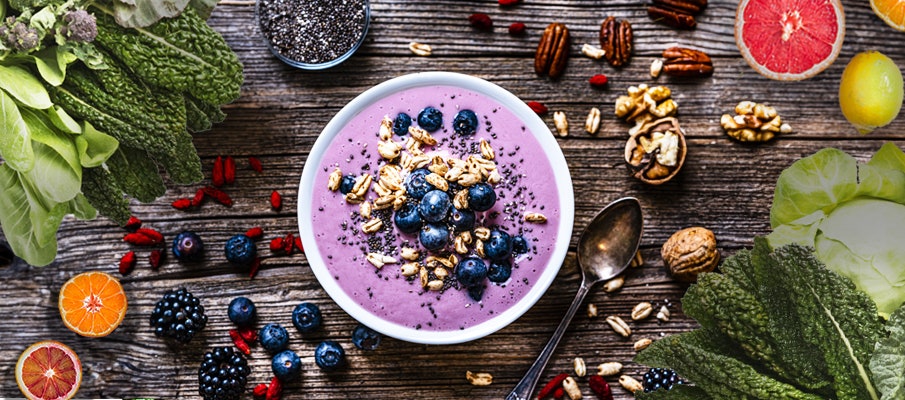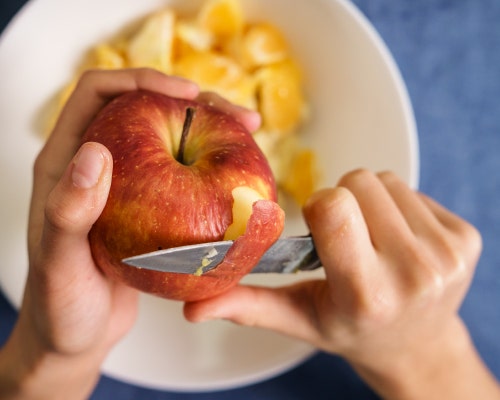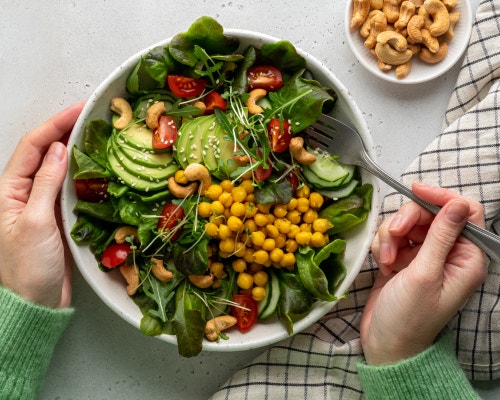From Plate to pH: Foods That Support Vaginal Health
- 4/19/24


Most women probably haven’t spent much time thinking about how their food choices affect their vagina — but it turns out we should! In fact, what we eat can influence vaginal pH, microbial balance, and even sex drive. Now that I have your attention, let’s talk about how to support your vaginal health with your diet.
The Vaginal Microbiome
You’ve heard of the gut microbiome, the community of bacteria, yeast, and fungi in the digestive tract that influence overall health. But did you know that your vagina has a microbiome of its own?
The vaginal microbiome is a delicate balance of microbes involved in immune defenses and maintaining optimal pH. An ideal vaginal pH level is between 3.8 and 5.0, creating an acidic environment that helps prevent harmful overgrowth. Imbalances in pH can increase your risk of infections and disruptions in the natural ecosystem of the vagina.
Emerging research suggests that diet plays a substantial role in the vaginal microbiome. Certain foods can encourage beneficial bacterial growth but others can disrupt the balance.
Diet and Vaginal pH
What you eat directly influences the acidity or alkalinity of your vaginal environment. Nutrient-poor foods, such as those high in added sugar and refined carbohydrates, can increase vaginal pH. This creates a more alkaline environment conducive to the growth of harmful microbes. A diet high in these types of foods is pro-inflammatory.
Some foods that may increase vaginal pH include:
- Soda
- Potato chips
- Ultra-processed packaged snacks
- Grain products may with refined white flour
- Baked goods and desserts
On the other hand, a diet rich in nutrient-dense fruits, vegetables, fermented foods, and adequate hydration can help maintain an optimal acidic pH level. This supports the growth of beneficial bacteria and helps maintain a healthy balance.
Foods that Support Vaginal Health
Antioxidant-Rich Fruits and Vegetables
Antioxidants help protect your cells from damage and oxidative stress that otherwise promotes inflammation and disrupts the microbial balance. Fruits and vegetables are full of antioxidants. Aim to eat a variety of berries, leafy greens, and citrus fruits.
Fermented Foods
Fermented foods have undergone a process of fermentation, during which beneficial bacteria, yeasts, or molds convert sugars into alcohol or organic acids. In other words, they’re natural sources of probiotics. Including probiotic foods in your diet can promote a healthy vaginal microbiome.
Examples of fermented foods include yogurt, tempeh, miso, sauerkraut, kimchi, and kefir. If you don’t consume these foods often, you might consider a probiotic supplement designed specifically for women’s vaginal pH, like Dr. Formulated Probiotics Women's pH 50 Billion 30 Capsules.
Omega-3 Fatty Acids
Omega-3 fatty acids are unsaturated fats known for their anti-inflammatory properties. There’s some evidence that they may benefit female sexual health and reproductive function. Good sources of omega-3s include fatty fish, like salmon, tuna, and mackerel, as well as flax seeds, chia seeds, and walnuts.
Water
Drinking plenty of water helps to ensure proper hydration throughout the body. This includes the mucous membranes of your vagina, which can affect its natural lubrication and moisture balance. Proper hydration also supports your body's ability to flush out toxins and maintain a healthy acidic environment in the vagina.
Diet and Libido
Good nutrition supports hormone regulation, circulation, and energy levels, all of which are necessary for a healthy libido. Oppositely, ultra-processed foods may contribute to hormonal imbalances, fatigue, and decreased libido over time.
Foods that promote blood flow and cardiovascular health — like leafy greens, berries, and fatty fish — may indirectly enhance sexual desire. Dark chocolate and avocados contain compounds that may boost mood and promote feelings of arousal, acting as natural aphrodisiacs.
What you eat plays a significant role in supporting vaginal health. By choosing nutrient-rich foods and ensuring adequate hydration, women can support their vaginal and sexual health.
References
-
Deka N, Hassan S, Seghal Kiran G, Selvin J. Insights into the role of vaginal microbiome in women's health. J Basic Microbiol. 2021;61(12):1071-1084. doi:10.1002/jobm.202100421
-
Lin YP, Chen WC, Cheng CM, Shen CJ. Vaginal pH Value for Clinical Diagnosis and Treatment of Common Vaginitis. Diagnostics (Basel). 2021;11(11):1996. Published 2021 Oct 27. doi:10.3390/diagnostics11111996
-
Barrientos-Durán A, Fuentes-López A, de Salazar A, Plaza-Díaz J, García F. Reviewing the Composition of Vaginal Microbiota: Inclusion of Nutrition and Probiotic Factors in the Maintenance of Eubiosis. Nutrients. 2020;12(2):419. Published 2020 Feb 6. doi:10.3390/nu12020419
-
Tristan Asensi M, Napoletano A, Sofi F, Dinu M. Low-Grade Inflammation and Ultra-Processed Foods Consumption: A Review. Nutrients. 2023;15(6):1546. Published 2023 Mar 22. doi:10.3390/nu15061546
-
Vašková J, Klepcová Z, Špaková I, et al. The Importance of Natural Antioxidants in Female Reproduction. Antioxidants (Basel). 2023;12(4):907. Published 2023 Apr 11. doi:10.3390/antiox12040907
-
Kudesia R, Alexander M, Gulati M, Kennard A, Tollefson M. Dietary Approaches to Women's Sexual and Reproductive Health. Am J Lifestyle Med. 2021;15(4):414-424. Published 2021 May 8. doi:10.1177/15598276211007113
-
Wierenga KA, Pestka JJ. Omega-3 Fatty Acids And Inflammation - You Are What You Eat!. Front Young Minds. 2021;9:601068. doi:10.3389/frym.2021.601068
-
Khanjari Z, Iravani M, Abedi P, Ghanbari S. Effect of Omega-3 fatty acid supplementation on sexual function of pregnant women: a double blind randomized controlled trial. Int J Impot Res. Published online July 19, 2022. doi:10.1038/s41443-022-00598-w
-
Salas-Huetos A, Arvizu M, Mínguez-Alarcón L, et al. Women's and men's intake of omega-3 fatty acids and their food sources and assisted reproductive technology outcomes. Am J Obstet Gynecol. 2022;227(2):246.e1-246.e11. doi:10.1016/j.ajog.2022.03.053
-
Giersch GEW, Charkoudian N, Stearns RL, Casa DJ. Fluid Balance and Hydration Considerations for Women: Review and Future Directions. Sports Med. 2020;50(2):253-261. doi:10.1007/s40279-019-01206-6





